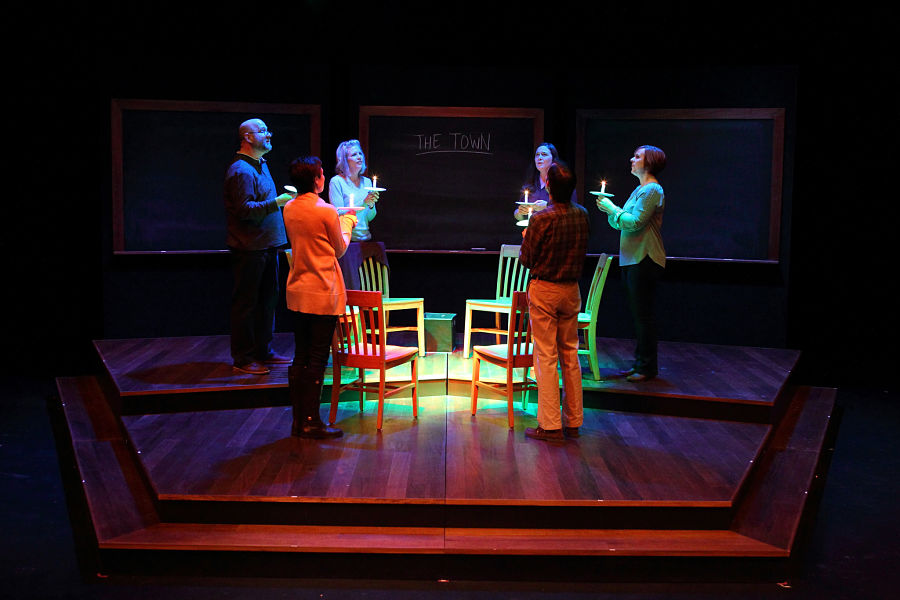Actor-writer Eric Ulloa was catering a holiday party, just days after the massacre at Sandy Hook Elementary School in Newtown, Conn., on Dec. 14, 2012, when he was taken aback by how “everyone was laughing and dancing and enjoying themselves. I thought, ‘How could the world keep spinning after this horrific thing had just happened?’”
Of course, he understood life does go on, but he could not stop thinking about how 20 children and six adults had just been killed. He aired his feelings on social media and obsessively followed the news as the coverage shifted from stories about the murders, the killer and the victims’ families to stories about gun and mental health legislation.
Eventually the media encampment left the picturesque New England town and Ulloa thought, “What happens now to the people who live there?” So, he thought: “I can do something. I can use my art.”
What evolved was 26 Pebbles, which is receiving its world premiere at the Human Race Theatre in Dayton, Ohio. (The collegiate premiere was presented at the University of Wisconsin—La Crosse and a benefit reading was held at the Arena Stage in Washington, D.C., last year.)

When Ulloa began working on the project, he knew he wanted to speak with people in Newtown, but not specifically to any of the victims’ families and friends. First Ulloa reached out to Moises Kaufman, whose Tectonic Theater Project created The Laramie Project, following the murder of Matthew Shepard in 1998. The show was also based on interviews, and Ulloa sought Kaufman’s input on where to start.
“Moises was so kind and gave me some great advice,” says Ulloa. “He also said I had a tool that he didn’t: Facebook. That was a way I could begin to connect with people there. I couldn’t just show up and say, ‘Excuse me, ma’am,’ at the grocery store. That would have been so inappropriate.”
Through a local Newtown Facebook group, Ulloa connected with a resident who agreed to talk with him — but then she had second thoughts the night before their meeting. “She said, ‘I know you think your intentions are good, but you have to understand that a filmmaker just came here trying to do something similar and was run out of town, so please don’t come. We’ve had enough,'” Ulloa recalls. “It gave me pause, but I knew I wasn’t trying to gain anything for myself, and that what I wanted to do had merit. I just wanted to go there, see for myself what I could do to help, be a vessel, just listening, hearing stories. I didn’t know what it was going to be.”
But unlike the Tectonic group which arrived shortly after the Shepard murder, Ulloa went to Newtown five months after the massacre. “Mine needed the separation of time,” he says. “It needed to see the flowers and the leaves blooming again. It needed to see the town start to come back to life again.”
One by one, he started to talk with shopkeepers, city counselors, and longtime residents who began to share their thoughts and the emotional weight they were feeling.
“He was a super nice guy, you could just tell,” says Yolie Moreno, a resident of the town who worked as a volunteer cataloging the letters and gifts sent to the town from around the world.
During that first visit, Ulloa realized the end result would be a play. Being in the New England setting and talking with “regular people,” he was reminded of Thornton Wilder’s Our Town and he started to think of 26 Pebbles as “an existential town meeting.”

In his three visits in spring 2013, he talked to more than 60 people. He even stayed at residents’ homes on future trips. By that summer he had the interviews transcribed, and that fall, when he was performing in The Most Happy Fella at the Goodspeed Opera House in East Haddam, Conn., he crafted his play.
He assembled it in pieces “like a puzzle,” fitting together similar expressions and themes, and eschewing the conversations that were more agenda-driven, “however great and noble.”
He says one of the voices that best represents the play comes from Carol, who ran town hall “and who had been there forever.” “She was salt-of-the-Earth: tough, real, a woman you don’t mess with,” says Ulloa. “But the way she started to open up, sharing things that she was grappling with. ‘You live in this small town, this tiny bubble, and you have your way of life,’ she said. ‘Then the peace, the innocence is shattered.'”
Goodspeed held a reading of the one-act play—which features six actors playing 22 parts—and there was a New York reading on the one-year anniversary of the murders, which some of his interview subjects attended.
Over the next three years, readings of the play continued as Ulloa became involved with other projects, including his year-and-a-half stint as an actor in the Broadway musical On Your Feet!
Since that first reading what’s changed is “the high number of shootings. Yes, I would want the play to be seen in New York, but here, we’re preaching to the choir. I want this play to go right into the heartland.”
Says Newtown’s Moreno: “We were ordinary people thrust into extraordinary circumstances. Especially in a time like now when people are so disillusioned by humanity, it’s nice to go back and remember how people reacted in the face of tragedy. The best of people really came out.”
Frank Rizzo is a writer for Variety, The Hartford Courant, Connecticut Magazine, and the Hearst newspapers of Connecticut, among other media outlets. Follow him on Twitter at @ShowRiz.


